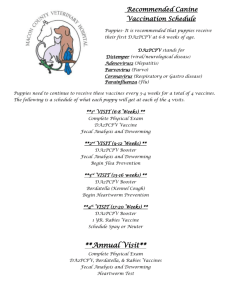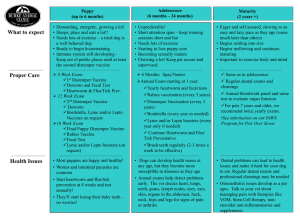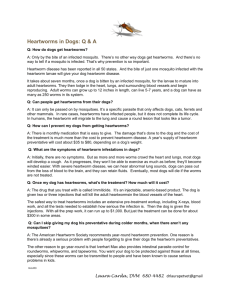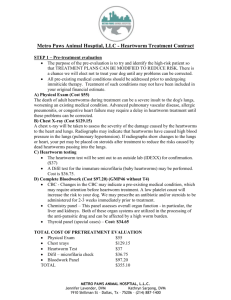Canine Pediatric Health & Wellness Plan Healthy Paws Veterinary
advertisement
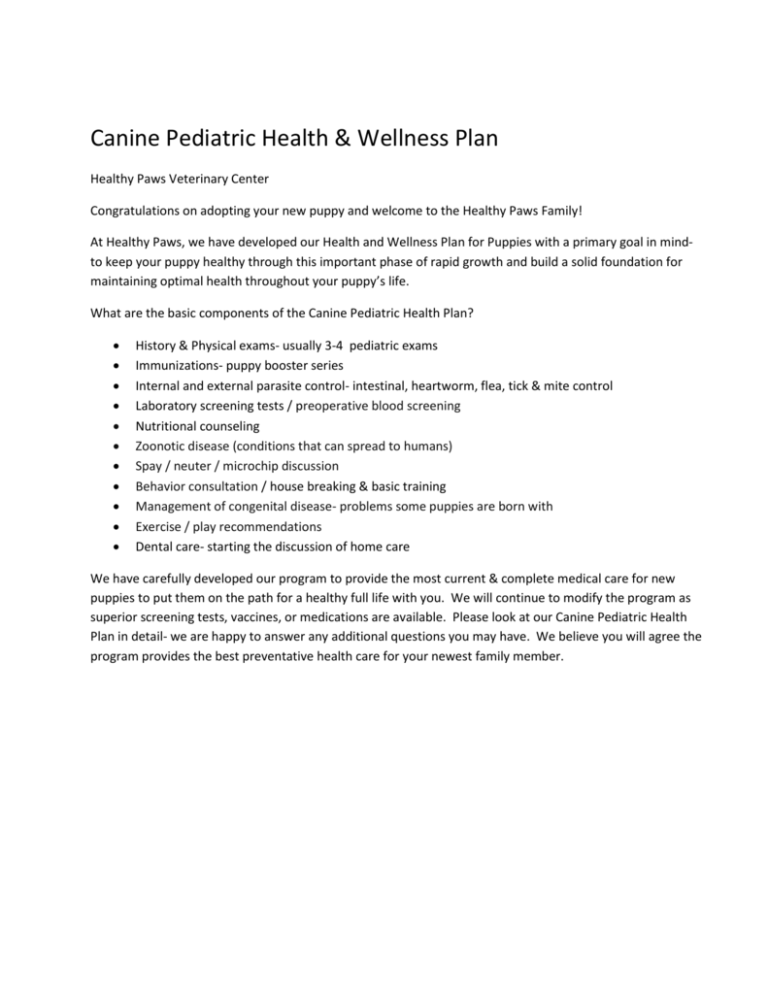
Canine Pediatric Health & Wellness Plan Healthy Paws Veterinary Center Congratulations on adopting your new puppy and welcome to the Healthy Paws Family! At Healthy Paws, we have developed our Health and Wellness Plan for Puppies with a primary goal in mindto keep your puppy healthy through this important phase of rapid growth and build a solid foundation for maintaining optimal health throughout your puppy’s life. What are the basic components of the Canine Pediatric Health Plan? History & Physical exams- usually 3-4 pediatric exams Immunizations- puppy booster series Internal and external parasite control- intestinal, heartworm, flea, tick & mite control Laboratory screening tests / preoperative blood screening Nutritional counseling Zoonotic disease (conditions that can spread to humans) Spay / neuter / microchip discussion Behavior consultation / house breaking & basic training Management of congenital disease- problems some puppies are born with Exercise / play recommendations Dental care- starting the discussion of home care We have carefully developed our program to provide the most current & complete medical care for new puppies to put them on the path for a healthy full life with you. We will continue to modify the program as superior screening tests, vaccines, or medications are available. Please look at our Canine Pediatric Health Plan in detail- we are happy to answer any additional questions you may have. We believe you will agree the program provides the best preventative health care for your newest family member. HPVC- Canine Pediatric Wellness Program Schedule Age of Puppy Core Vaccination Non-core Vaccination Parasite Control 6-8 weeks DHPP #1 booster (Distemper-HepatitisParainfluenza-Parvo Virus) Bordetella * recommended for all pups for baseline immunity Fecal testing DHPP #2 booster Leptospirosis #1 booster *recommended for almost all patients (Doctor visit) 10-12 weeks (Doctor visit) Strategic Dewoming Start monthly Heartworm prevention Strategic Deworming Repeat fecal test if initial test was positive Start Tick & Flea control Lyme #1 booster *recommended for most patients 12-14 weeks (Tech visit ) Canine Influenza (CIV ) #1 14-16 weeks DHPP #3 (final) booster (Doctor visit) Rabies vaccination Leptospirosis #2 (final) booster 16-18 weeks Lyme #2 (final)booster (Tech visit) CIV #2 (final) booster Strategic Deworming (final) 6 months- Spay surgery for female dogs; 6-12 months- neuter for male dogs 1 year - Canine Adult Wellness Exam Core vaccinations- DHPP, Rabies Non-Core vaccinations- Lepto, Lyme, Bordetella, CIV 4DX testing- screens for heartworm disease and exposure to Lyme, Anaplasma, & Ehrlichia (all tick transmitted diseases) Fecal screen for parasites Why Vaccination for your Puppy are Vital There are many very serious and highly contagious diseases that your puppy can contract if not properly protected. Fortunately, safe and effective vaccines have been developed for most of these diseases. Similar to human babies, puppies require a series of vaccines (boosters) given during the first 4 months of life-when maternal antibody protection is wearing off and the puppy’s own immune system is maturing. By following recommended vaccination protocols, you are giving your dog a solid core immunity that will protect from infectious diseases throughout their lifetime. Vaccines are typically given in conjunction with the pediatric wellness exams at 8 weeks, 12 weeks, and 16 weeks of age. Depending on the size of your pup and the number of vaccines to be given, your doctor may recommend splitting the vaccines over two sessions. What are we vaccinating against? Core vaccines are those that are recommended for all dogs and include rabies, distemper, hepatitis, & parvovirus. Non-Core vaccines also protect against serious diseases but may not be appropriate for all dogs based on breed or individual lifestyle. Non-core vaccines include Bordetella (kennel cough), Lyme, Leptosprirosis, canine influenza (H1N6), canine melanoma, & porphorous (dental disease vaccine). At Healthy Paws, your doctor will discuss which non-core vaccines are appropriate for your dog and your lifestyle and develop a vaccine strategy for each individual patient. Distemper- A very contagious virus that causes gastro-intestinal, respiratory, and end stage neurological disease. Approx 80% of dogs who contract the disease die despite treatment. Hepatitis (Canine Adenovirus 2)- Causes severe damage to the liver Parvovirus- Causes bloody diarrhea and suppression of the immune system. Rabies- A fatal viral disease that can affect any warm-blooded mammal including humans. There is no cure for rabies. Infected pets must be euthanized and all exposed persons must receive a series of painful rabies vaccinations. Common wildlife vectors include raccoons, bats, foxes, skunks, & woodchucks. Leptospirosis- is a bacterial disease that causes severe liver and kidney disease. The bacteria is spread through the urine of wildlife and causes similar disease in humans. Lyme disease- A tick transmitted disease communicable to both dogs and humans. In dogs, Lyme typically causes acute lameness, joint swelling, fever, lethargy, and occasionally kidney failure. Bordatella-Parainfluenza- Commonly known as “kennel cough”, these respiratory diseases are highly contagious, causing coughing, tracheitis, bronchitis, and occasionally a severe bronchopneumonia. Canine Influenza (H1N6) - a new variant strain of Equine Influenza causing widespread respiratory disease in exposed dogs. Although majority of dogs show mild signs and recover fully, approximately 5% of dogs in an outbreak die of fatal pneumonia. Parasite Control Protecting the health of your puppy and your family… At each pediatric visit, we will check for the following: Intestinal parasites via fecal (stool) exam Ear mites Fleas, ticks, and other skin parasites Ringworm (fungal infection) Treat for the following: Intestinal parasites (strategic deworming) Prescribe more intensive treatment for any identified parasitic infestation Prescribe topical Flea/Tick prevention based on age How do we test a stool sample? With the most common method, we mix a small amount of stool with a sugar solution that causes the parasite eggs to separate from the rest of the fecal material, float up, and stick to a glass slide which we then look at under the microscope. Each type of parasite has a unique egg size and shape. Eggs are microscopic and can be missed if the worms are not shedding eggs the day the sample is collected. Yikes, I see actual worms in the stool! Sometimes puppies do pass adult worms- especially after a deworming. Roundworms look like spaghetti, and tapeworms look like small flat tan grains of rice. Call us if you ever see worms on your dog’s hind end or in feces! In cases of chronic diarrhea & weight loss in puppies that have negative fecal tests, we may recommend additional testing for more rare parasitic diseases. Common Tick Diseases in Westborough Ma: Lyme Disease- Borreliosis Anaplasmosis Heartworm Disease, Prevention & Testing Heartworm disease is a serious risk to your dog. Heartworms are parasites that live in your dog’s heart and pulmonary vessels. Adults can grow to 1 -2 feet in length and live an average of 5-7 years. It is not uncommon to find more than 30 worms in an infected dog. When left untreated, infected dogs will eventually develop heart disease and failure Transmission of heartworm disease is through mosquitoes. The microfilaria (baby heartworms) are injected into your dog when a mosquito bites, so even a dog that is not outdoors a lot can still be infected—it only takes a single mosquito bite. From there the larva migrate from the skin though tissues and eventually mature into an adult heartworm that resides in the heart. The maturation process takes 6 months, so prevention focuses on killing the immature worms BEFORE they become adults. Once heartworms become adults, they are very difficult to kill. The only effective drug is an arsenic derived compound and the dying worms in the heart can cause significant damage to the lungs and even cause death. It is both costly and more risky to kill adults compared to prevention. Prevention is easy, safe and effective. Healthy paws generally prescribes IVERHEART Plus / Max which are flavored tablets containing ivermectin and pyrantel. When consistently given monthly throughout the year, Iverheart is 100% effective . We start pups on heartworm prevention at their first pediatric visit, but testing is usually first done at the 1 year visit. Healthy Paws also carries limited supplies of Heartgard & Interceptoralternative heartworm preventives. Heartgard contains the same drugs as Iverheart but is in a chewy treat form instead of a flavored tablet. Interceptor is a flavored tablet like the Iverheart, but uses a different drugmilbemycin to kill the baby heartworms. All three brands are safe and 100% guaranteed effective . Testing for heartworm disease is recommended yearly starting at the 1st year Canien Adult Wellness Exam. At Healthy Paws, we use the 4DX snap test which not only tests for adult heartworms, but also tests for exposure to Lyme disease, Anaplamosis, and Ehrlichia- the latter three are bacterial diseases carried and transmitted by ticks. By testing annually, we not only get important information on exposure to ticks and the common tick related diseases, but also make sure none of our patients go undiagnosed with heartworm disease should a failure with the preventive occur. Topical Flea & Tick Prevention- Vectra Healthy Paws currently recommends Vectra by Summit for flea and tick prevention. Vectra is approved for puppies 7 weeks and older and is applied directly to the skin in several locations along the back. The compound absorbs but is contained in the lipid layer of the skin where it slowly releases over the next month. Vectra Kills and Repels- ticks, biting flies, mosquitoes, and all stages of flea life including eggs, pupae, larve, and adults. General recommendation is to treat seasonally- usually March/April through Nov /Dec based on weather patterns. Some folks decide year round prevention works better for them. Any time it is over 45 degrees F, the ticks are out and questing for a blood meal. So check your dogs carefully on those “unseasonably” balmy winter days for ticks if you choose to treat seasonally.
